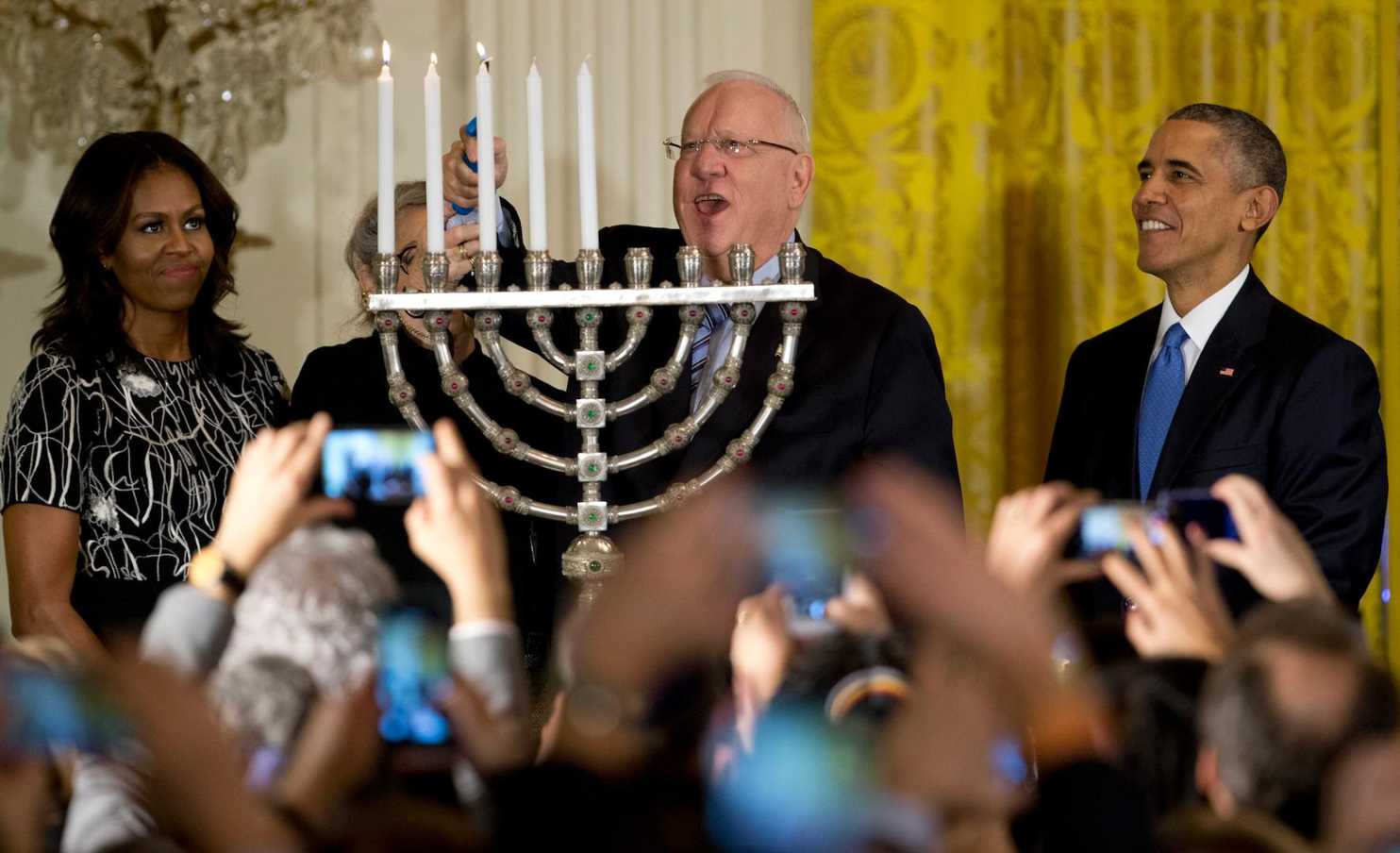 Israeli President Reuven Rivlin lights a menorah as he joins President Obama for a Hanukkah reception at the White House, December 9, 2015 (Photo by Reuters)
Israeli President Reuven Rivlin lights a menorah as he joins President Obama for a Hanukkah reception at the White House, December 9, 2015 (Photo by Reuters) U.S.
Robert Malley and Stephen Pomper, two senior advisers to President Obama, find a recent NYT piece about the war on ISIS particularly troubling:
Those dead civilians that The New York Times found not to have been counted were not counted by the Obama administration. They were not counted by people who were intent on limiting civilian casualties and ensuring transparency. That those safeguards proved inadequate even in the hands of an administration that considered them a priority raises particularly vexing questions.
Derek Chollet believes Israel should be careful about associating itself with the Trump administration:
The danger is that being “pro-Israel” becomes a status confined only to Trump’s Republicans. Israel will not benefit from a relationship defined by partisanship, and it is foolish for Israeli leaders to fuel this, even if they are doing so unwittingly. Think of the next generation of Democratic political leaders, who will mainly remember the bitterness of the Obama era and stand against pretty much anything Trump is for. How will the Israeli government’s big bet on Trump look to them?
Israel
Shlomi Eldar writes about how Israel’s Education Ministry has been aligning itself with the right-wing ideology of minister Naftali Bennett:
Al-Monitor spoke with Aharon Barnea, a member of the Forum of Bereaved Families. His son Noam was killed in the battle for the Beaufort during the First Lebanon War (1982). He said that once the ministry learned that there was a commotion in the school over the cancellation, it claimed that it had not given the order to cancel the event. Barnea refuted the claim, saying that representatives of the parents were present in the principal’s office when she received the phone call from the ministry, and that while they were still there, the principal had called the district head to appeal the decision. Her supervisor told her that the activity was forbidden, and that she must cancel it. “There were teachers there who burst into tears,” said Barnea. “Two teachers even said that they were ashamed to be Israeli.”
Jerry Seinfeld talks about the difference between Israeli Jews and NY Jews and about how Israel inspired him at the beginning of his career:
Speaking to Hadashot news, Seinfeld said he he was not planning any special material for the Israeli crowd in his shows here. “It’s special for them, it’s special for me,” he said of his trip to Israel, noting that “Jews in Israel are not like New York Jews, they are not so whiny. Same dog, different breed.”
But he credited Israel with giving him the impetus to be a comedian, recounting how he spent the summer of 1970 on a kibbutz in northern Israel, cutting leaves in the banana fields.
Middle East
Hassan Hassan is not sure whether it is game over in Syria:
It is too early to tell whether this is game over in Syria. The gains for the regime over the past year are the most significant since the start of the conflict. Much of the fighting is paused throughout the country. The regime and its allies seem to have the upper hand on the political front too.
At the same time, the regime still has profound economic and military limitations. Much of the country is still out of its control, mostly under the influence of countries like Turkey and the US, and future scenarios will depend almost entirely on the choices made by the two countries, not those of the regime and its allies.
Steven Metz tries to figure out why Russia punches above its weight geopolitically:
Nevertheless, even when Russia punches above its weight geopolitically for all these reasons, it is important to remember that Moscow’s impact is much like that of al-Qaida or the self-styled Islamic State: It can weaken vulnerable nations and society and undercut existing systems of order and authority, but it cannot create a viable alternative. The good news is that however much Russia draws from the Soviet Union’s playbook, it will never be able to build a world order centered on Moscow.
Jewish World
Emma Green talks to Rabbi Sharon Braus about politics in today’s synagogue:
I went to give a talk at a [synagogue] in the early spring, and I asked the rabbi in advance of the talk, ‘Are there any hot-button issues I should avoid?’ I don’t really go there to get them in trouble; I want to make sure I know where the community is. And he said, ‘You can talk about anything you want, but not politics.’ He said, ‘We have three Trump supporters in the community’—three, out of a community of 1800 families—‘and they will go ballistic.’ He was told, after the inauguration, not to say the word ‘Pharoah’ because it seems political, like an attack on Trump. Rabbis are being told, because there are three people who think that the most profoundly indecent candidate for president that we have ever seen, and the most unqualified, reckless, bigoted and indecent candidate has risen to power, that now we can’t speak Torah anymore because it might make people think we’re uncomfortable with that person and his values.
Eliora Katz discusses the difference between President Trump’s and President Obama’s Hanukkah speeches:
In the tale of two Hanukkahs who’s right? Is Trump making Hanukkah great again or is this a case of alternative facts? Is Hanukkah really a story of freedom as American as apple pie or as distinctly Jewish as a fried potato latke?






















 More news and opinions than at a Shabbat dinner, right in your inbox.
More news and opinions than at a Shabbat dinner, right in your inbox.